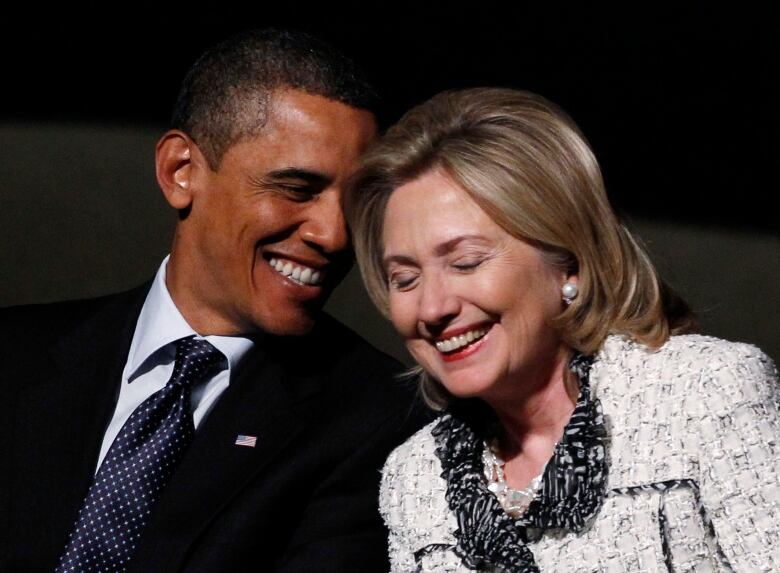Hillary Clinton faces 'delicate' distancing act from Obama
Former secretary of state should be careful how she criticizes U.S. president, analysts say

Hillary Clinton isn't tiptoeing away from her former boss.
Instead, she has taken a clear and giant step away from U.S. President Barack Obama and his handling of the Syrian crisis, suggesting it was a "failure" and also casting doubt on his foreign policy approach generally.
Clinton, the former secretary of state and potential 2016 Democratic presidential candidate, made the noteworthy comments in a lengthy interview about foreign policy issues published last weekend in The Atlantic.
"The failure" to build up a fighting force against Syrian President Bashar al-Assad "left a big vacuum, which the jihadists have now filled," Clinton said.
In her recently published book Hard Choices, she writes about how she advocated for arming Syrian opposition fighters early on and that Obama resisted, but she's now using some of her bluntest language yet about the consequences of the president’s decision.
Clinton was also asked in The Atlantic for her thoughts on the slogan used in the White House to describe the administration’s foreign policy approach: "Don’t do stupid shit." "Stuff" is commonly used in the more polite version of the phrase.
"Great nations need organizing principles, and 'Don't do stupid stuff' is not an organizing principle," Clinton responded.

Any efforts Clinton makes to distance herself from the president will come as no surprise, political observers say, in large part because of Obama's sinking approval ratings. It's a typical reason candidates separate themselves from the administration in which they once worked.
"It's easier to distance yourself from a wounded president than from a healthy one. You are able to separate much more easily, more gracefully and politically, much more profitably," said Ross Baker, a political science professor at Rutgers University.
Obama's approval rating sinking
When former vice-president Al Gore ran for president in 2000, he obviously made a break from President Bill Clinton, whose reputation had been tarnished by the sex scandal involving White House intern Monica Lewinsky.
In that instance, Clinton still enjoyed high approval ratings as president, but the American public wasn't happy with his personal actions. Gore tried to associate with Clinton's popular policies, while disassociating from Clinton personally.
Walter Mondale is another example of a vice-president who sought to be president and had to walk the same tightrope in 1984. He was considered loyal to President Jimmy Carter, but also made known his differences on policy issues with his former boss.
These are delicate dance steps that they have to do.- Ross Baker, political scientist, Rutgers University
George H.W. Bush also fit the pattern, serving as vice-president to President Ronald Reagan and putting distance between them when it was his turn to run.
Clinton, while not a vice-president, is facing the same dilemma as past candidates. She doesn't need to establish her own identity the way others have had to. She's got that, but she does need to put space between herself and an increasingly unpopular White House, analysts say.
Obama is getting slammed by his critics over his foreign policy in particular, and given Clinton's role as secretary of state, it's an area that's difficult for her to avoid, said Geoffrey Skelley, from the University of Virginia's Center for Politics.
"She has a lot of foreign policy experience and she can be readily tied to the Obama administration on this issue, so it seemed like an obvious spot for her to try to distance herself now that she's out of the administration," he said. "It's a set of issues that the American public is perhaps particularly displeased with how the administration is handling things."
Clinton should make 'tactical criticisms'
But Clinton has to be careful with how she goes about this tightrope distancing act, observers say.
Matthew Baum, a professor at Harvard University's John F. Kennedy School of Government, said she has to make "tactical criticisms."
"In general, she has to be critical of the administration's foreign policy without going too far. She can't go too far because it's going to blow back to her; there's no way to get around that," said Baum. "But you have to focus on things that are least likely to have your fingerprints on them."
That's why you might hear Clinton talking more about Syria than what happened in Libya, for example.
Any criticisms Clinton makes about Obama's foreign policy decisions will come with some risk.
This summer's violence in the Middle East, and the ongoing conflicts in Syria, Iraq and Ukraine, for example, are all situations that could change significantly between now and 2016.
"Anybody telling her exactly where to draw these lines is making educated guesses," said Baum.
"Given the overwhelming dominance she's got right now in the field, she needs to play it pretty close to the chest and not go out on too many limbs and take big risks. She needs to keep the risks small."
Baker also said Clinton needs to be mindful of how she criticizes Obama, because she risks alienating parts of the electorate who do support him.
"A too severe attack on the president would cause problems for her with African-Americans. The president's standing with them is measurably higher than it is with other Americans," he said. "You want to create some separation but not do it in such a way as to alienate a significant portion of your electoral constituency."
She needs to decide how aggressive and hawkish she wants to be as a potential president because she could also alienate Democrats who advocate for a non-interventionist foreign policy, Baker said.
For presidential candidates who have had close ties with an administration, the process of carving out their own identity and distancing themselves involves walking a fine line.
"These are delicate dance steps that they have to do," said Baker.